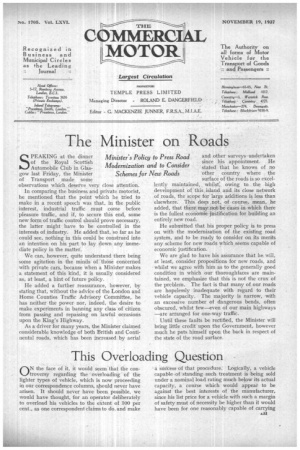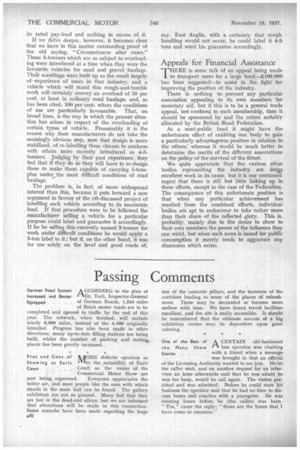This Overloading Question
Page 1

Page 2

If you've noticed an error in this article please click here to report it so we can fix it.
ON the face of it, it would seem that the controversy regarding the overloading of the lighter types of vehicle, which is now proceeding in our correspondence columns, should never have• arisen. It should never have been possible, we would have thought, for an operator deliberately to overload his vehicles to the extent of 100 per cent., as one correspondent claims to do, and make • a StteCessof that procedure: Logically, a vehicle capable -of standing such treatment is being sold under a nominal load, rating much below its actual capacity, a course which would appear to be against the best interests of the Manufacturer, since his list price for a vehicle with such a margin of safety must of necessity be higher than it would have been for one reasonably capable of carrying its rated pay-load and nothing in excess of it.
If we delve deepet, however, it becomes clear that we have in this matter outstanding proof of the old saying, "Circumstances alter cases." Those 3-tonners which are so subject to overloading were introduced at a time when they were the favourite vehicles for sand and gravel _haulage. Their scantlings were built up as the result largely of experience of users in that industry, and a vehicle which will stand this rough-and-tumble work will certainly convey an overload of 50 per cent. at least in ordinary road haulage, and, as has been cited, 100 per cent. where the conditions of use are particularly favourable. That, on broad lines, is the way in which the present situation has arisen in respect of the overloading of certain types of vehicle. Presumably it is the reason why their manufacturers do not take the seemingly obvious step, now that design is more stabilized, of re-labelling these chassis to conform with others more recently introduced as 4-5tonners. Judging by their past experience, they feel that if they do so they will have to re-design these to make them capable of carrying 5-tonsplus under ;the most difficult conditions of road haulage.
The problem is, in fact, of more widespread interest than this, because it puts forward a new argument in favour of the oft-discussed project of labelling each vehicle according to its maximum load. If that procedure were to be followed the manufacturer selling a vehicle for a particular purpose could label and guarantee it accordingly. If he be selling this currently named 3-tonner for work under difficult conditions he would apply a 3-ton label to it ; but if, on the other hand, it was for use solely on the level and good roads of, say, East Anglia, with a certainty that rough handling would not occur, he could label it 4-5 tons and word his guarantee accordingly.
Appeals for Financial Assistance
THERE is some talk of an appeal being made to transport users for a large fund-2100,600 has been suggested—to assist in the fight for improving the position of the industry. There is nothing to prevent any particular association appealing to its own members for monetary aid, but if this is to be a general trade appeal, not confined to such membership, then it should be sponsored by and the return suitably allocated by the British Road Federation. As a semi-public fund it might have the unfortunate effect of enabling one body to gain a particularly advantageous position in relation to the others; whereas it would be much better to determine the merits of the different associations on the policy of the survival of the fittest. We quite appreciate that the various other bodies representing the industry are do* excellent work in its cause, but it is our continued regret that there is still but little linking up in these efforts, except in the case of the Federation. The consequence of this unfortunate position is that when any particular achievement has resulted from the combined efforts, individual bodies are apt to endeavour to take rather more than their share of the reflected glory. This is, probably, mainly due to the desire to show to their own members the power of the influence they can wield, but when such news is issued for public consumption it merely tends to aggravate any dissension which exists.




























